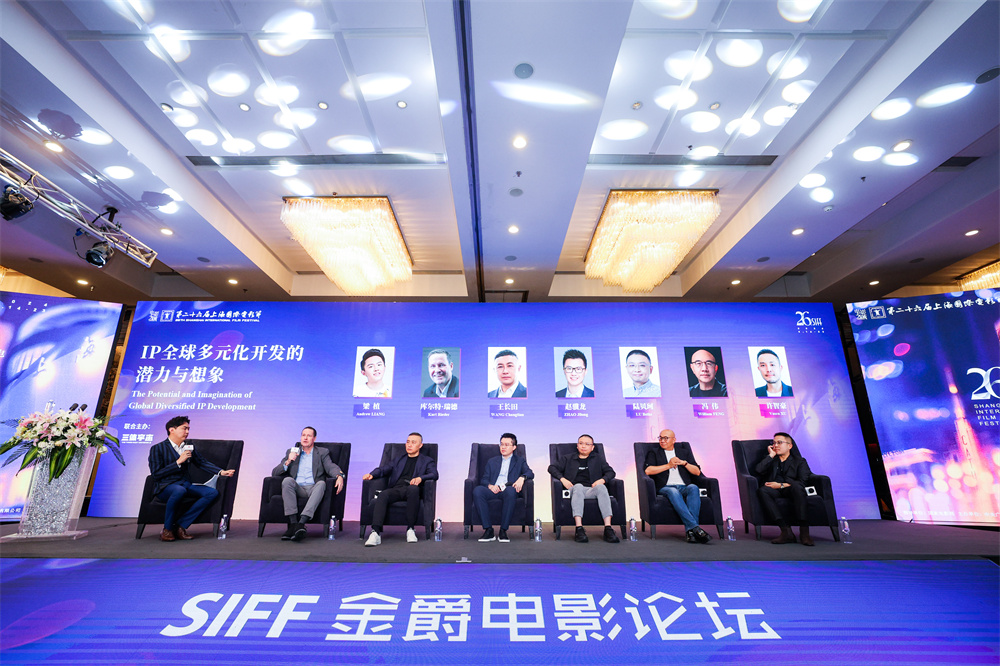
In recent years, IP development has been increasingly valued and sought after in China's film and television production sector. The long science fiction novel "The Three-Body Problem" written by Liu Cixin is particularly representative, and has spawned radio dramas, animation series, TV series, and various related products. It has even gone abroad and was remade into a popular series by Netflix, the world's largest streaming platform. Just yesterday, there was another big news that Zhang Yimou will direct the film version.
In this context, the Shanghai International Film Festival Golden Goblet Film Forum held on June 18th specially set up the theme of "The Potential and Imagination of Global Diversified Development of IP", and invited guests from IP operating companies, Hollywood film companies, domestic film companies, creative teams, and film and television associations to discuss related topics such as the standards for creating and selecting IP, the challenges and opportunities in the IP development process, and the balance between globalization and localization.

Forum site
The biggest challenge for the movie version of "The Three-Body Problem" is the choice of content from the original work
At the forum, Wang Changtian, chairman of Enlight Media, who spoke first, said straight to the point: "I have been working on IP for so many years, but it is not as good as the IP of The Three-Body Problem. Yesterday, after we announced that we would cooperate with director Zhang Yimou to develop a movie version of The Three-Body Problem, it quickly aroused great reactions from all sectors of society. I realized the powerful influence of this IP, and also felt the pressure on my shoulders."
"IP itself is a neutral word, it is a general term for intellectual property. A good IP has the power to spread across generations and regions. But it is not something you can develop just because you want to. It must be the result of a lot of labor and wisdom, and a very deep understanding of all aspects of society and human nature. It is very regrettable that there are still very few IPs from China that are truly influential internationally."
"To be honest, our initial development of The Three-Body Problem was not successful, and we have only now found a new breakthrough. This time, under the leadership of Director Zhang Yimou, we are much more confident than before," Wang Changtian revealed. "In fact, we proposed to Director Zhang a few years ago that he should direct The Three-Body Problem, but he did not accept it at the time. After a long period of communication and trust between the two sides, he finally agreed."
When asked about the current status of the preparations for the movie version of "The Three-Body Problem", Wang Changtian said, "The movie version of "The Three-Body Problem" is still in the stage of polishing the script, and at the same time, we are screening other creative personnel besides the director and screenwriter from all over the world. The biggest challenge we are facing now is the choice of the content of the original work. We will definitely respect the original work, but it is impossible to put all the content of the original work into one movie. In fact, I think no matter how we choose, there will definitely be people who are dissatisfied, so we are also prepared to bear certain criticisms in the future."
When talking about the considerations of the Chinese market and overseas markets, Wang Changtian said frankly: "It is first and foremost a Chinese film, and everything will be done within this framework." He also added: "In addition to respecting the original work and the director, other aspects are open, including the investment amount, which has no upper limit. As much investment as needed will be made."
As for whether it will be made into a series or a single work, Wang Changtian made it clear that he would only shoot one film first, and then make plans based on the response of the film.

Wang Changtian
In addition to the movie version of "The Three-Body Problem", Wang Changtian revealed that Enlight Media is currently working on an IP development project for the "Chinese Mythology Universe". "We have sorted out Chinese myths and legends over thousands of years and reassembled them into a new worldview, hoping to present it in the form of an animated film. The initial plan is that it will take about 20 to 30 years to complete the first phase of construction."
The thorny issue of content selection mentioned by Wang Changtian, when it comes to the creative team of the TV version of "The Three-Body Problem", is how to respond to the expectations of the original fans. Director Lu Beike said, "Including me and Director Yang Lei, we are actually science fiction fans, and we should say we are also fans of Liu Cixin. We still want to present the original fans' initial feelings when reading this work, and have not thought about making too big an adaptation. The initial feeling is that it is always a realistic science fiction story that takes place in a very Chinese context. After all, the first part does not have elements of outer space like the third part."
Lu Beike revealed that the script of the second part of the TV series "The Three-Body Problem", "The Dark Forest", has been completed by 80%, and the concept design, art, etc. are also being followed up.

Lubeike
The movie version of "The Three-Body Problem" has a long way to go before it goes overseas
So, in the context of globalization, what kind of IP has the potential for development? Kurt Rieder, senior vice president of distribution at Warner Bros. Discovery Cinemas (Asia Pacific), gave his own observations. "In general, I think the best IPs developed by both Warner and Disney are not based on history, religion, or literature. In fact, it is very difficult for works with distinct regional characteristics to go overseas. On the contrary, it is much easier to develop cross-cultural works of fantasy or science fiction that start from scratch, because they can transcend factors such as politics and history. So, you can see that Harry Potter has achieved global success. Although its original work is in English, it is not so deeply rooted in the local culture. It is essentially a work with a fantasy color."
When asked about his suggestions for the future distribution of the film version of "The Three-Body Problem", Reid said, "Mr. Wang has made it very clear just now that "The Three-Body Problem" is first and foremost a Chinese film. On this basis, I think we can explore a mixed distribution method, including theaters and streaming media. We can find that some American films now pay too much attention to the international market, but forget where their core audience is, and ultimately fail to achieve commercial success. When we released "Dune" in the beginning, we paid close attention to the opinions of core fans and actively tried to understand what they wanted to see in the movie. For example, when we released "Tom and Jerry", we paid great attention to the feedback from the Chinese market. In general, we still have to think clearly about the original intention of making this movie."

Kurt Reid
Feng Wei, Vice President of Asia Pacific and President of Greater China of the Motion Picture Association of America, took the "Megalodon" series jointly produced by China and the United States as an example to reveal that the key to avoiding detours when Chinese film and television companies extend their IP development tentacles to overseas regions is to cooperate with Hollywood companies that have established a mature distribution system around the world. "The Meg is an IP jointly developed by Warner Bros. and China Media. Its success has established confidence for our Chinese IP to go global."

Feng Wei
However, when it comes to the future overseas distribution of the movie version of "The Three-Body Problem", Feng Wei admitted: "It feels quite difficult. Because it is different from "The Meg", which is an international story in itself, but the story of "The Three-Body Problem" is very localized. In fact, Chinese films, including blockbusters like "The Wandering Earth 2", have not been well distributed overseas in recent years, because they were originally made for the Chinese market. However, the IP of "The Three-Body Problem" now has a certain international reputation. I think for Mr. Wang, how to balance the investment recovery in the local market and expand influence in the global market is a big challenge. If possible, I still hope that Hollywood companies like Warner Bros. can participate in its global distribution. After all, our Chinese companies have not yet formed a global distribution system."
In the view of Zhao Jilong, CEO of Three-Body Universe, market analysis and research cannot be ignored if local IP wants to succeed overseas. "Last year, when we started to plan our content export, we conducted research in some key countries and regions around the world, such as the United States, Japan, and Europe. We also went to Leyard to understand how people in different regions understand The Three-Body Problem. Such research around the world is the core and foundation of our work."
Talking about the future development plan of the "Three-Body" IP, Zhao Jilong said, "Our company is called 'Three-Body Universe'. As the name suggests, our main mission and vision is to develop and operate the overall IP. We have been doing this for nearly ten years, and there are still at least ten to twenty years to go in the future. Whether it is live-action movies, animations, movies, live-action series, etc., we will have a twenty-year development plan, and the final rhythm and effect should be to launch one or two top works every year. At the same time, we also hope to further open up the Three-Body Universe through characters, eras, and organizations on the basis of the original work, and continue to expand. In the future, we will continue to look for new IPs like "Three-Body" that are worthy of full industry chain development."

Zhao Jilong
Movie version of "Supernova" = "The Hunger Games" + "Ready Player One" + "Interstellar"?
It cannot be denied that whether an IP can be successful is a matter of metaphysics. However, the sensitivity and insights of industry insiders also play a key role. Xu Zhihao, co-founder and chief creative officer of Laizhe Entertainment, who worked at Legendary Pictures in Hollywood for many years, proved this point with his experience in developing the movie "Dune".
"My former boss bought the film and television adaptation rights of Dune as early as 2012. After we joined Legendary Pictures in 2016, we began looking for a suitable director. We approached many big-name Hollywood directors at the time, but no one wanted to step into the trap of David Lynch's remake, so they all refused. It wasn't until we saw Denis Villeneuve being interviewed by the media after filming Blade Runner 2049 and asked what he wanted to shoot next that he said he had always wanted to shoot Dune. In fact, we didn't know this information before, so we contacted him and the conversation turned out to be very compatible. This shows that a good IP still needs to wait for a suitable creator to properly open up this universe."
However, meeting the right creator seems to be just a good start. To achieve success, it still needs to go through many polishing steps. Taking "Dune" as an example, Xu Zhihao continued: "The content of the first draft of the script actually only ended when Dr. Yue, played by Chang Chen, betrayed the Atreides family. Everyone felt that this was not good, and there was basically nothing to watch, because such an international production should have enough action scenes, but due to the budget, we had to cut a lot of action scenes. After several rounds of script revisions, we started filming in 2019."
"After the filming, the director and I watched the three-hour rough cut in the viewing room before Hans Zimmer's score was added. I remember that I almost fell asleep because the whole rhythm was very slow. I saw the protagonist Paul walking and talking there, sometimes talking to his father, sometimes talking to his mother, and sometimes talking to the doctor. We wondered what to do, and finally decided to reshoot - the first 30 minutes of the first Dune were reshot later. And our visual effects supervisor Paul Lambert is very good. He has won two Oscars for "Blade Runner 2049" and "First Man on the Moon". Of course, "Dune" won an Oscar later. But we didn't think about winning the award at the beginning. Everyone was sincere and felt that this work could create a new aesthetic style. As for the box office and Oscar later, I think it was God's gift."

Xu Zhihao
Xu Zhihao also revealed the progress of Liu Cixin's early work "Supernova Era" which is currently under development. "This novel is about a future world where a supernova explodes and causes the earth to be irradiated, all adults die, and the earth is taken over by a group of 13-year-old children. When I first saw this novel, I felt that it was very similar to "Lord of the Flies", but it is difficult to adapt it into a film and television version because it is about a group of children fighting and killing each other. Many years later, when I returned to China to start a business, Mr. Zhao found me again and mentioned the film and television adaptation. Later, we found a very compatible point. I think that Chinese science fiction movies now basically focus on visual effects, such as "The Wandering Earth 2", including the future movie version of "The Three-Body Problem", which will definitely pay attention to special effects. "Supernova Era" will be a science fiction movie that is more youth-oriented, similar to "The Hunger Games" plus "Ready Player One" plus a little bit of "Interstellar". Because Liu Cixin created a world similar to the metaverse in this work, he wrote this concept earlier than the American "Snow Crash"."


